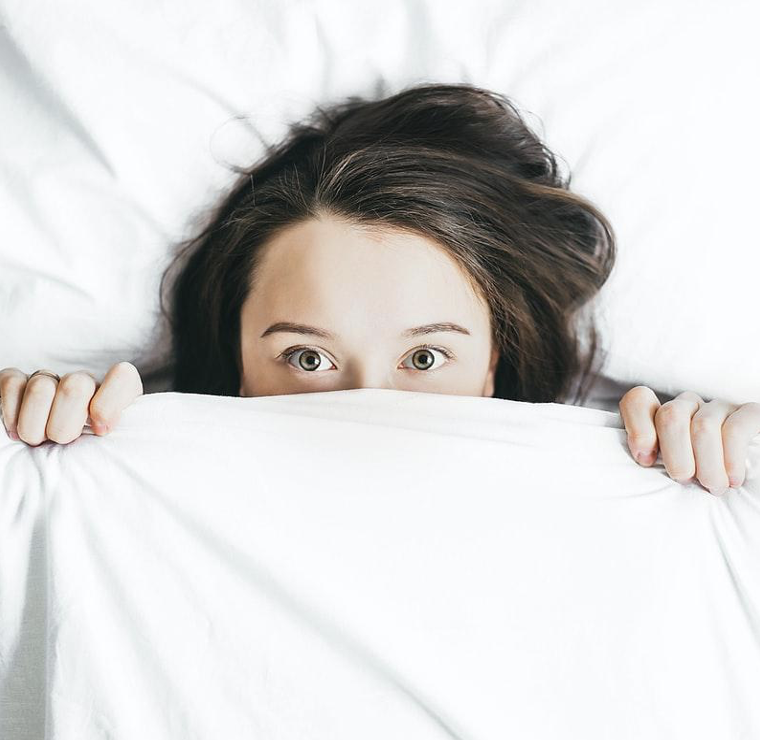What are the keys to good health besides a healthy diet, daily exercise, and stress-busters? Several studies show that getting a full night’s sleep on a comfortable mattress is another piece of the puzzle. Here’s why. Sleep deprivation has become a worldwide problem with the United States averaging 6.8 hours per night, according to Gallup.
We all know from personal experience that a full 7 to 9 hours of nightly sleep is crucial for good physical and mental health. Meanwhile, lack of sleep can cause negative effects on your energy levels, emotional balance, and work productivity. It can even cause weight gain!
I’d like to share some basic steps I’ve found that can help to prevent you from tossing and turning all night. If counting sheep isn’t working then read on.
Tip #1: Change Your Daytime/Nighttime Light Exposure
Sun, Skin and Melatonin
During night it’s best to sleep in the dark to boost your body’s levels of the sleep hormone melatonin.
The daytime is different. In fact, it’s important to experience exposure to natural light and especially in the morning. This helps your internal clock control your sleep/wake cycle.
Your body’s “circadian rhythms” can provide energy boosts from sunlight exposure. The same biorhythms also tell your body at night that it’s time to go to sleep.
Blue Light
During night you should minimize exposure to artificial light and especially “blue light” from sources like fluorescent light bulbs, PCs, and mobile devices. You can use tools like Flux software tweak your display screen based on the time of day. It includes a blue light-blocking feature for night screen time.
You should also try to stop looking down at small screens on smartphones and tablets at least one hour before snoozing after you find the ideal mattress.
Other steps include minimizing blue light at nighttime. Switch off bright lights and TV sets two hours before bedtime.
What is Blue Light? (video)
Tip #2: Create and Follow a Bedtime Schedule/Routine
Sleep & Wake Times
Both are important. The actual time you go to sleep is less important than going to bed about the same time every night. This is important to help your body clock to follow its natural rhythms.
Here’s another tip. You should also make sure you’re sleeping and waking at times that provide at least 7 hours of sleep per night, according to the American Academy of Sleep Medicine.
If possible try to avoid sleeping in. Yes, that includes weekends and holidays! One night of over-sleeping can disrupt your sleep/wake cycle and affect your sleep quality later on.
Let’s be honest. There’s no magic formula like choosing among the best mattresses, but you should try to follow the same bedtime routine to improve sleep quality. Some possible options include:
- Count backwards from 50 to 1
- Wear ear plugs and/or eye mask
- Set an intended dream topic
- Set a bedtime alarm
- Spray lavender mist into the air
- Write down one empowering word
- Do meditation or breathing exercises
- Repeat a bedtime mantra
- Switch on your phone’s “bedtime” feature
- Write down 5 good things in your life
Following the same routine might help to nod off faster and get more rapid-eye movement sleep (deep sleep) when most dreaming takes place.
Tip #3: Eat, Drink, and Exercise Lightly before Bedtime
Food
Many health experts recommend not eating after 6:00PM or so. In the evening the body’s metabolism slows down, so a heavy meal can prevent it from its nighttime processes involving digestion and metabolism.
If you’re going to have a snack around bedtime, then keep it light and healthy. Some good options include fresh fruits, veggies, and protein. You should also try to eat your snack at least one hour before bedtime. Eat a full meal at least two hours before hitting the hay.
Drinks
Try drinking one glass/cup of water before bedtime. This can help to prevent dehydration since the body loses 1 liter of water from breath humidity while sleeping, according to The Sleep Doctor. Avoid alcohol and caffeine close to bedtime since they can keep you up.
Nicotine
Cigarette smoking at night can boost brain activity and heart rate, which can both prevent you from cycling through the 5 sleep stages. Another option is to quit smoking.
Exercise
Some light exercise at least two hours before bedtime might help to improve sleep quality. You should also consider regular workouts 3 or 4 days during the week, which should include cardio and weight-resistance exercises.
Nighttime Stretches to Help Relax before Bed (video)
Tip #4: Create a Sleep-promoting Environment
Something called sleep hygiene involves creating a sleep routine to follow every night. Another important step is to create a sleep-friendly environment.
Sleep Environment
It’s important for a bedroom to be a sleep-inducing environment that can help you doze off. This can improve sleep quality and help to promote uninterrupted sleep at night. Here are some helpful tips:
- Select quality bedding that’s soft, comfy, and breathable
- Add essential oils through diffusers or spray bottles
- Try to find the ideal mattress and pillow
- Minimize bright lights and loud sounds
- Reduce clutter on the bedroom floor
- Switch off strong lights 2+ hours before bedtime
- Install a dimmer switch to reduce lighting at bedtime
- Listen to “white noise” like nature sounds/soft music
- Add cool colors (blue/green/violet) in the room
- Provide enough walking space around your bed
- Maintain a room temperature of 65°F (18°C)
Some of the most overlooked elements of your sleep environment include the bed and mattress. For example, a smaller mattress size might not provide enough space for you to stretch out.
Here are some features to keep in mind. Make sure the mattress provides enough support/firmness based on whether you’re a back, side, or stomach sleeper. Airflow is also important. Memory foam tends to have less air circulation versus latex and innerspring mattresses.
Tip #5: Try to De-stress before Bedtime
Studies show that nearly one-quarter of adults have sleeping problems because of stress and anxiety, according to DisturbMeNot.
You can take some basic steps to de-stress at bedtime (or before) including:
- Do yoga poses or meditation before bedtime
- Read a bedtime story in a print or electronic book
- Delay dealing with any issues/problems until the next day
- Take a warm bath or shower before sleeping
- Make a list of things you’re thankful for
Conclusion
Sleep deprivation has become a pandemic with countries like Sweden, Japan, and Saudi Arabia only averaging about 6 hours per night. This is greatly due to factors like the Digital Age’s 24/7 information feeds.
If you’re having problems getting enough slumber at night, there are many tried and true remedies to try out. Changing your sleep routine/environment, starting some stress-busting techniques, or reading a guide to perfect mattress might help you to sleep sooner and longer. You can rest assured!
By BRETT ARMSTRON





